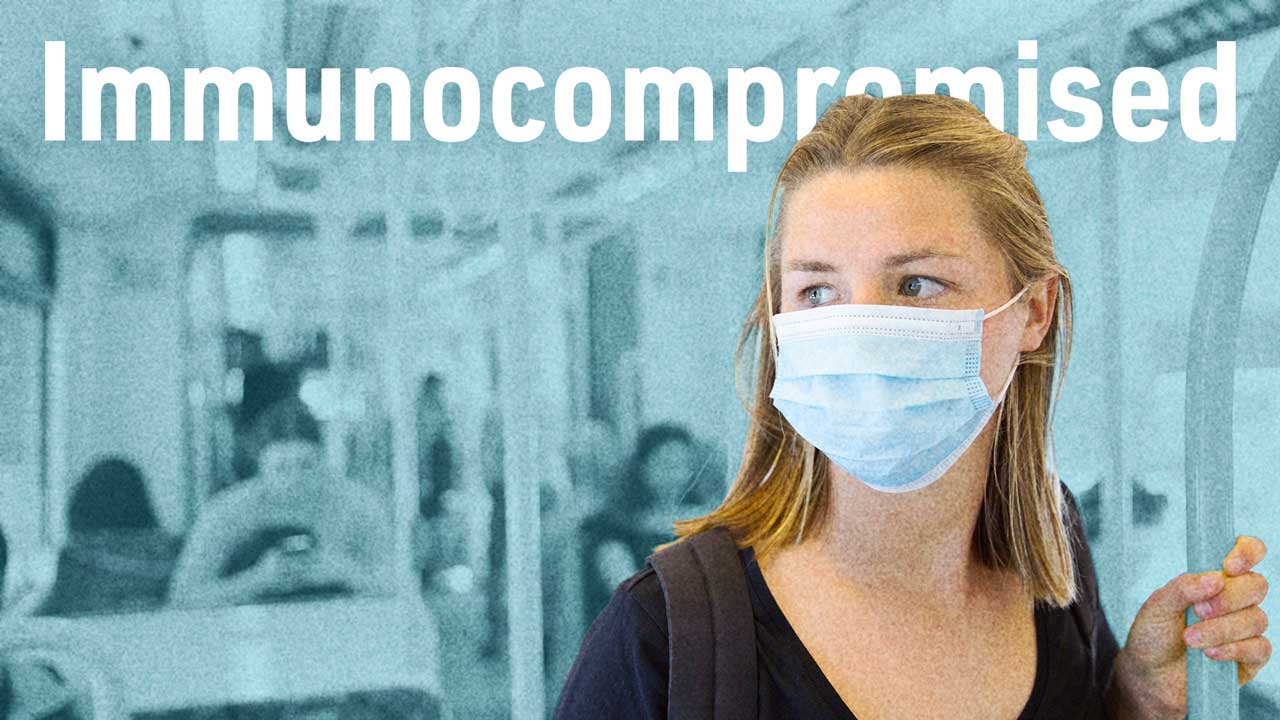People who are immunocompromised are affected more frequently and severely by infections.
The term immunocompromised (or immunosuppressed) refers to people who have an ‘immunodeficiency’ or weakened immune system, meaning their ability to fight infections and diseases is reduced (Vincent 2023).
There are two types of immunodeficiency:
- Primary immunodeficiency: Chronic, genetic disorders causing an individual to be born without some immune defences or with an impaired immune system.
- Secondary immunodeficiency: Immunodeficiencies acquired from environmental factors such a disease.
(Mayo Clinic 2022; British Society for Immunology 2017)

Primary Immunodeficiency
Primary immunodeficiencies comprise over 400 disorders caused by genetic defects in the immune system. They cause the immune system to function less efficiently than normal, potentially causing complications. These disorders are often inherited (ASCIA 2024).
Primary immunodeficiencies may be mild and evade detection for years, or they may be severe enough to be noticed right at birth (Mayo Clinic 2022).
They fall broadly into one of the following six categories:
- Antibody deficiency (B cell) deficiencies
- Combined (both B and T cell) immunodeficiencies
- This category includes severe combined immunodeficiency (SCID), which causes opportunistic infections and failure to thrive in infants due to little-to-no immune function. It is serious and can be fatal unless diagnosed and treated early.
- Phagocytic cell deficiencies
- Complement deficiencies
- Immune dysregulation - this is a broad category that occurs when the immune system isn’t controlled normally and may react to its own cells.
- Autoinflammatory disorders.
(ASCIA 2024; Fernandez 2023a; ASCIA Immunodeficiency Strategy 2021)
Secondary Immunodeficiency
Secondary immunodeficiencies are more common than primary immunodeficiencies. They are acquired after the immune system is weakened by an external factor (Primary Immunodeficiency UK 2017) such as:
- Human immunodeficiency virus (HIV) infection
- Malnutrition
- Immunosuppressive treatments such as chemotherapy.
(British Society for Immunology 2017; Fernandez 2024b)
Secondary immunodeficiencies may also affect critically ill, older or hospitalised people (Fernandez 2024b).

Risk Factors for Immunodeficiency
Currently, the only known risk factor for primary immunodeficiency is having a family history of a primary immunodeficiency disorder (Mayo Clinic 2022).
Diagnosing Primary Immunodeficiency
- Blood tests can be used to measure if a patient has a normal level of blood cells and immune system cells. They can also determine whether the immune system is responding properly.
- Prenatal or DNA tests may be used.
(Mayo Clinic 2022)
Symptoms and Effects of Immunodeficiency
Symptoms and effects may vary depending on the type of immunodeficiency. They can include:
- Infections that are:
- More frequent, persistent or harder to treat than what is typical
- Opportunistic (infections that occur more often or are more severe in immunocompromised people)
- Caused by unusual bacteria, viruses, fungi or parasites
- Frequent and recurring pneumonia, bronchitis, sinus infections, ear infections, meningitis or skin infections
- Inflammation and infection of internal organs
- Blood disorders (e.g. anaemia, low platelet count)
- Digestive issues (e.g. cramping, nausea)
- Delayed growth and development
- Autoimmune disorders
- Cancer
- Damage to the heart, lungs, nervous system or digestive tract
- Death from a serious infection.
(Mayo Clinic 2022; HIVinfo 2021; ASCIA 2024)
Additionally, those who are immunocompromised are more at risk of illness and death from some vaccine-preventable illnesses (AIH 2024).
How Can Immunocompromised People Reduce the Risk of Infection?
- Practice good hygiene
- Avoid contact with people who are sick
- Maintain dental hygiene and health
- Maintain a healthy, balanced diet
- Exercise regularly
- Avoid risky food items (e.g. unpasteurised milk, raw meat, cross-contaminated food)
- Take precautionary measures around animals and pets, especially if they are sick
- Take precautionary measures with travel
- Prevent insect bites
- Practice safe sex
- Get adequate sleep
- Manage stress.
(Mayo Clinic 2022; CPS 2025)

Vaccination for Immunocompromised People
Vaccination for people who are immunocompromised is challenging (AIH 2024).
Immunocompromised people are at increased risk of serious illness or death from certain vaccine-preventable illnesses. There are certain vaccines that are routinely recommened for immunocompromised people, and in some cases, they may require additional vaccine doses (AIH 2024).
However, live vaccines are often contraindicated in immunocompromised people due to the risk of adverse effects (AIH 2024).
The decision on whether to administer vaccines to an immunocompromised person should be made based on a thorough, individualised risk assessment and recommendations from the Australian Immunisation Handbook (2024).
Treating Immunodeficiency
Please note that immunodeficiency treatment will differ depending on many factors, including the type of immunodeficiency, the individual and the treatment options available.
Primary immunodeficiency disorders can be treated in several ways:
- Managing, treating and preventing infections contracted by the individual
- Therapies to boost the immune system
- Stem cell transplantation, which provides an individual with a normally functioning immune system.
(Mayo Clinic 2022)
Secondary immunodeficiencies can potentially be resolved if the underlying condition is treated (Primary Immunodeficiency UK 2017).
Test Your Knowledge
Question 1 of 3
How many primary immunodeficiency disorders are there?
Topics
References
- ASCIA Immunodeficiency Strategy 2021, Types of Primary Immunodeficiency Disorders (Inborn Errors of Immunity), Australasian Society of Clinical Immunology and Allergy, viewed 19 March 2025, https://www.nationalimmunodeficiencystrategy.org.au/types-of-pid
- Australasian Society of Clinical Immunology and Allergy 2024, Primary Immunodeficiencies (Inborn Errors of Immunity), ASCIA, viewed 19 March 2025, https://www.allergy.org.au/patients/immunodeficiencies/primary-immunodeficiency
- Australian Immunisation Handbook 2024, Vaccination for People Who are Immunocompromised, Australian Government, viewed 19 March 2025, https://immunisationhandbook.health.gov.au/vaccination-for-special-risk-groups/vaccination-for-people-who-are-immunocompromised
- British Society for Immunology 2017, Immunodeficiency, British Society for Immunology, viewed 19 March 2025, https://www.immunology.org/policy-and-public-affairs/briefings-and-position-statements/immunodeficiency
- Canadian Paediatric Society 2025, Safe Living Strategies for the Immunocompromised Child, Canadian Paediatric Society, viewed 19 March 2025, https://www.cps.ca/en/documents/position/immunocompromised-child
- Fernandez, J 2024a, Severe Combined Immunodeficiency (SCID), MSD Manual, viewed 19 March 2025, https://www.msdmanuals.com/en-au/professional/immunology-allergic-disorders/immunodeficiency-disorders/severe-combined-immunodeficiency-scid
- Fernandez, J 2023b, Overview of Immunodeficiency Disorders, MSD Manual, viewed 19 March 2025, https://www.msdmanuals.com/en-au/professional/immunology-allergic-disorders/immunodeficiency-disorders/overview-of-immunodeficiency-disorders#v27389432
- HIVinfo 2021, HIV and Opportunistic Infections, Coinfections, and Conditions, U.S. Department of Health and Human Services, viewed 19 March 2025, https://hivinfo.nih.gov/understanding-hiv/fact-sheets/what-opportunistic-infection
- Mayo Clinic 2022, Primary Immunodeficiency, Mayo Clinic, viewed 19 March 2025, https://www.mayoclinic.org/diseases-conditions/primary-immunodeficiency/symptoms-causes/syc-20376905
- Primary Immunodeficiency UK 2017, Secondary Immunodeficiency (SID), Immunodeficiency UK, viewed 19 March 2025, http://www.immunodeficiencyuk.org/static/media/up/secondaryimmunodeficiency.pdf
- Vincent, P 2023, Immunosuppression, Patient, viewed 19 March 2025, https://patient.info/allergies-blood-immune/immune-system-diseases/immune-suppression
 New
New 
